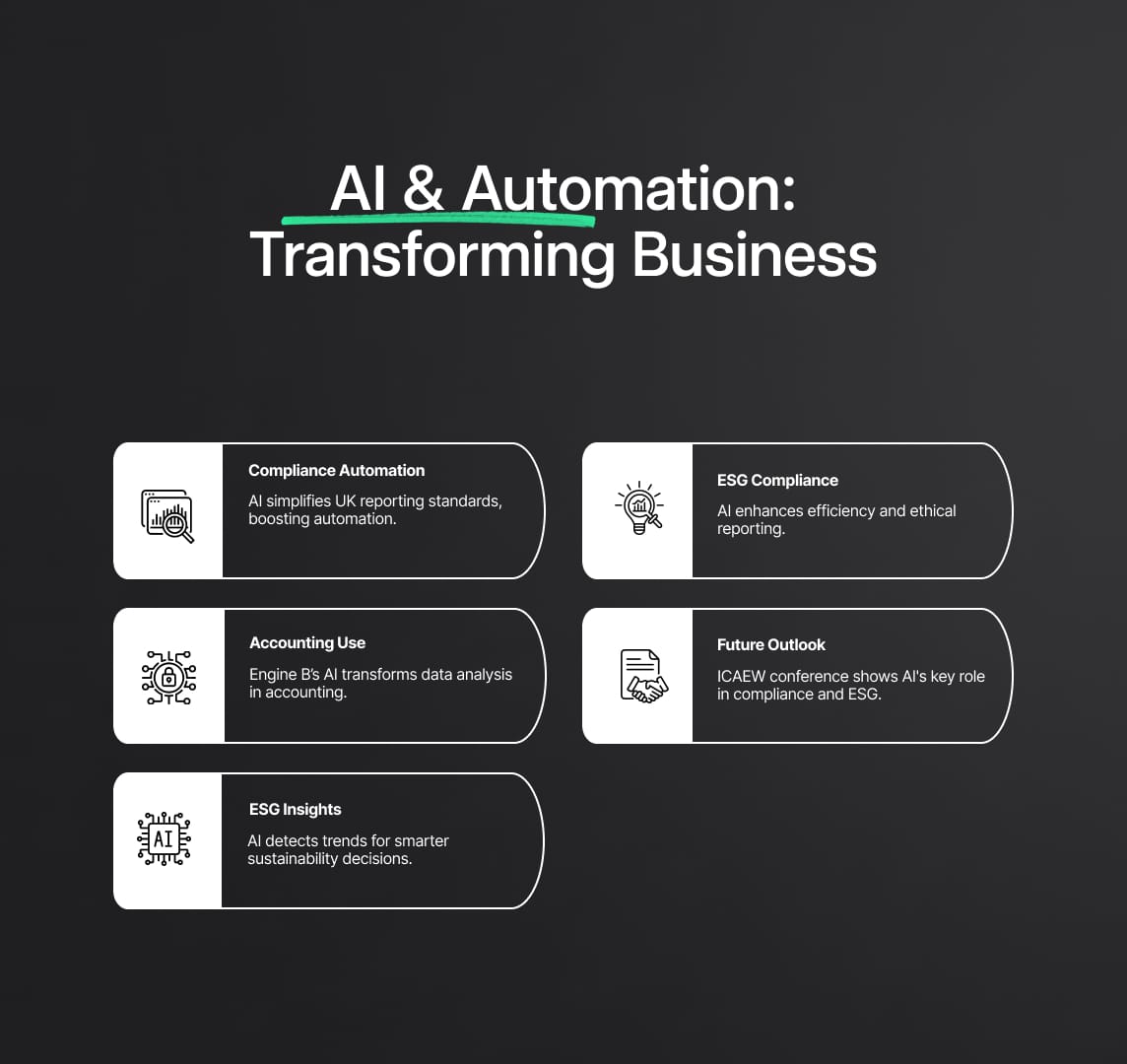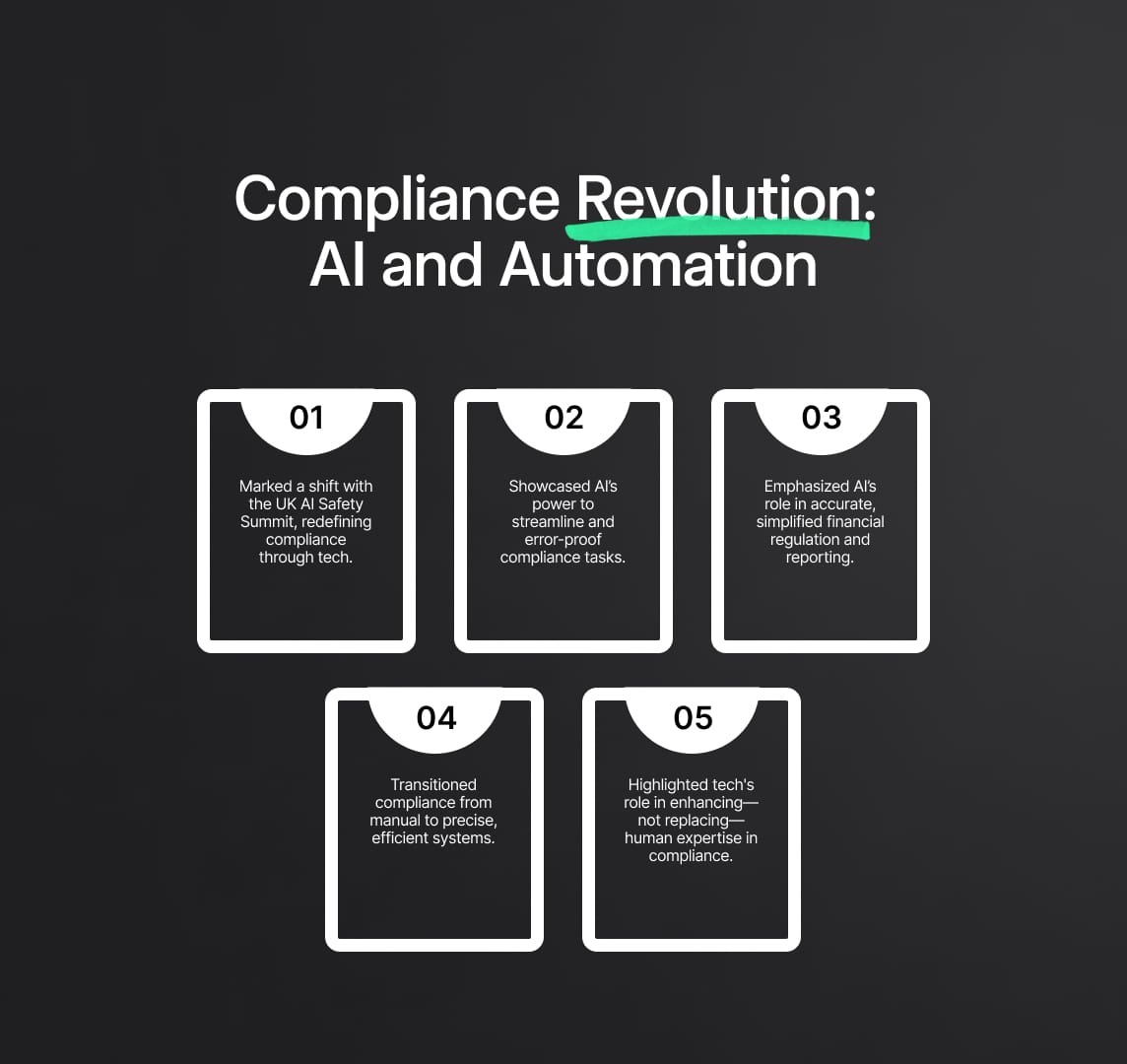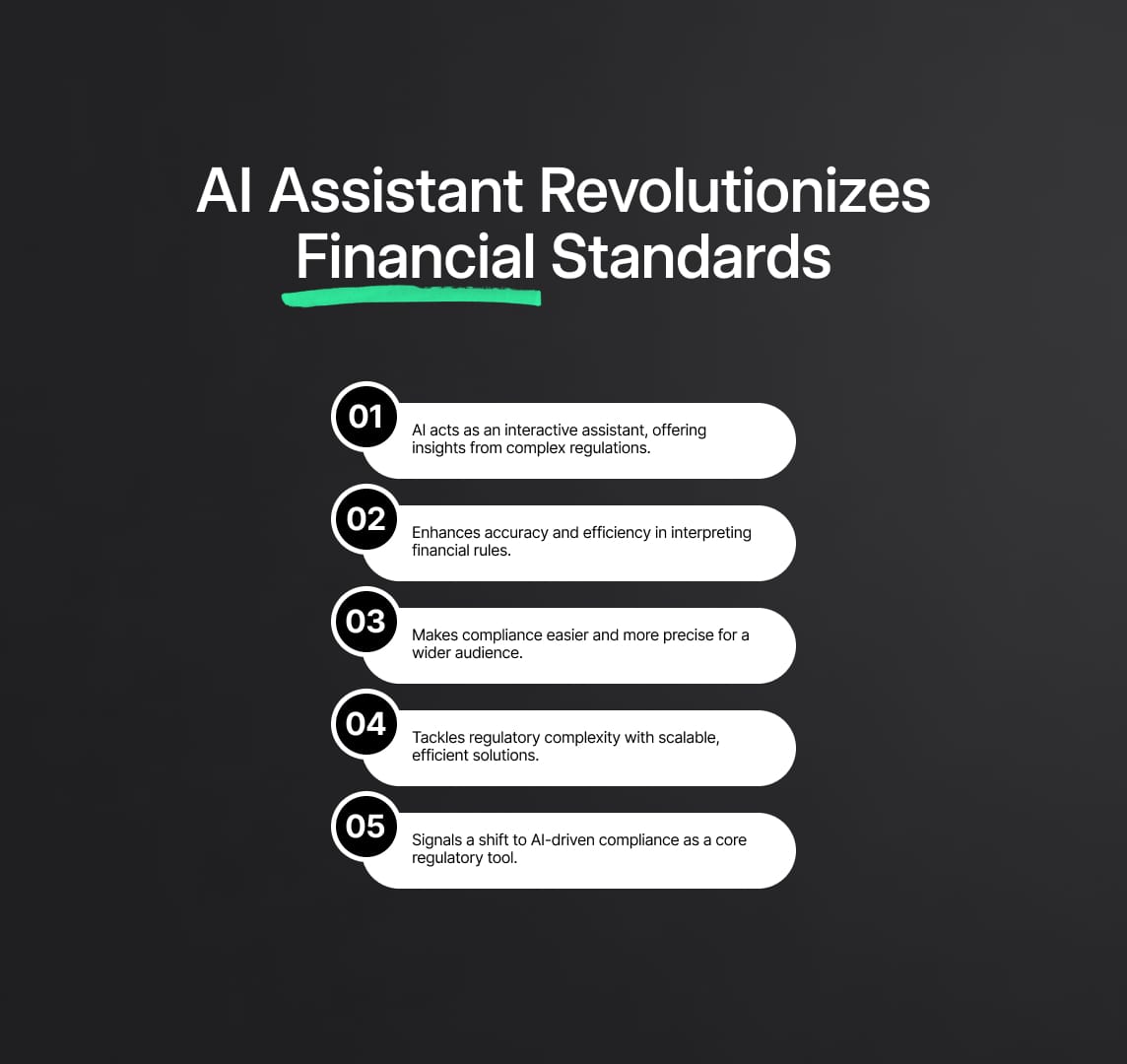Automation and AI: ESG Reporting
The ICAEW Annual Conference highlighted AI's transformative role in Compliance Automation and ESG reporting, showcasing advancements in financial regulation, tax compliance, and sustainable business practices.

Compliance Automation and AI in ESG Reporting and Accounting

AI and Automation at the Forefront: Transforming Business Practices
The most recent ICAEW Annual Conference explored the changing roles of automation and artificial intelligence (AI) in modern corporate processes in addition to revealing the newest technological advancements. In keeping with the UK government's AI Safety Summit, the program highlighted how these issues are coming together in today's tech conversation. Among the notable presenters was Nir Evron from Microsoft, who highlighted artificial intelligence's ability to simplify repetitive work and position it as a "copilot" that augments human abilities rather than substitutes them.
- AI's Role in Compliance Automation:
- Demonstrated an AI assistant proficient in the UK’s Financial Reporting Standards.
- Transformed complex regulations into user-friendly, easily referenced information.
- Marks a significant step in automating compliance processes.
- Practical Applications in Accounting:
- Engine B showcased an AI tool for the accounting sector.
- Highlighted AI's applications in data extraction and analysis.
- Reflects a revolutionary impact on work processes akin to the advent of automobiles in transportation.
- AI in Compliance and ESG Strategies:
- Integration of AI in compliance automation is a game-changer.
- Promises enhanced efficiency, accuracy, and scalability for businesses.
- Noteworthy in the context of sustainability and ethical practices.
- AI's Role in ESG Initiatives:
- AI's analytical capabilities in ESG initiatives are gaining prominence.
- Identifies trends and insights related to environmental impact, social responsibility, and governance.
- Enables data-driven decisions aligning with ESG objectives, crucial for sustainable brand image.
- Conference's Impact on the Future:
- The ICAEW Annual Conference sets the stage for a future where AI and automation are integral to compliance and ESG efforts.
- Promising avenues for businesses to enhance operational efficiency, meet regulatory demands, and achieve sustainability goals.
- AI emerges as an indispensable tool, mirroring historical shifts in technology and industry, shaping the modern business landscape.
To sum up, the ICAEW Annual Conference has shed light on how automation and artificial intelligence could revolutionize compliance and environmental, social, and governance initiatives. As these technologies develop, they present businesses with exciting chances to increase productivity, comply with regulations, and work toward sustainable objectives. Because of its enormous potential, artificial intelligence (AI) is a vital tool for navigating the complexity of the contemporary corporate environment.

Revolutionising Compliance Through AI and Automation
Transformative Impact: AI and Automation Reshape Financial Compliance
This year's ICAEW Annual Conference, held in conjunction with the UK government's AI Safety Summit, was a turning point in the financial and technological convergence. This event demonstrated the significant influence of automation and artificial intelligence on compliance automation, shedding light on the ways in which new technologies are radically changing the financial regulation and compliance landscape.
- Platform for Transformation:
- A turning point in the convergence of technology and finance.
- Collaborative event with the UK government's AI Safety Summit.
- Reshaping Compliance Processes:
- Highlighted the transformative impact of AI and automation on Compliance Automation.
- Demonstrated how these technologies make compliance processes more efficient and less error-prone.
- Efficiency in Financial Regulation:
- Platform for industry leaders to discuss and demonstrate AI and automation capabilities.
- Emphasized their role in simplifying compliance processes, ensuring accuracy, and meeting regulatory requirements.
- Particularly significant in financial reporting and regulatory adherence.
- From Manual to Precision:
- Represents a shift from cumbersome, manual processes in compliance.
- Addresses time-consuming tasks prone to human error.
- Introduces precision and efficiency unattainable with human capabilities alone.
- Augmenting Human Abilities:
- Advances in technology go beyond replacing manual labor.
- Focuses on augmenting human abilities.
- Enables compliance professionals to concentrate on more strategic and analytical aspects of their roles.
Automation and artificial intelligence (AI) are enabling a revolution in compliance processes that improves compliance professionals' accuracy and strategic focus while also streamlining operations. The occasion demonstrated a paradigm change from conventional approaches, paving the way for a day when human skill and technology work together to drive financial compliance.

AI in Financial Reporting: A Compliance Automation Milestone
AI Assistant Revolutionizes Financial Reporting Standards
One of the conference's main highlights was the presentation of an AI assistant that was knowledgeable about UK Financial Reporting Standards; this represented a significant advancement in Compliance Automation. This technical marvel opened the door for a revolutionary age in compliance procedures by demonstrating how AI can rethink the understanding and execution of financial regulations.
- Interactive Compliance Innovation:
- AI assistant stands out as a groundbreaking development in Compliance Automation.
- Not just a passive data processor but an interactive platform.
- Capable of understanding complex regulations and providing actionable insights.
- Elevating Standards:
- Transforms the way financial regulations are interpreted and applied.
- Elevates standards of accuracy and efficiency in financial reporting.
- Accessibility and Precision:
- Makes compliance more accessible to a broader audience.
- Offers a solution that goes beyond passive processing to actively assist in compliance tasks.
- Significantly enhances the precision of interpreting and applying financial regulations.
- Response to Complexity:
- Adoption of AI addresses the growing complexity of financial regulations.
- Provides a solution for businesses to navigate the ever-changing regulatory landscape.
- Offers efficiency and resource optimization in compliance processes.
- Central Role of Technology:
- Marks a profound shift where technology plays a central role in ensuring regulatory adherence.
- Opens the door to a new era of compliance, where AI actively contributes to efficient and effective regulatory compliance.
The AI assistant's demonstration marks a revolutionary step toward a time when the combination of financial compliance and AI will alter industry standards. The technology on display at the conference not only addresses the difficulties posed by intricate rules, but it also paves the way for a more technologically advanced, efficient, and easily accessible era of financial reporting and compliance.

ESG Reporting: The New Frontier for AI and Automation
The use of automation and artificial intelligence in ESG reporting was a hot topic of conversation at the conference. The importance of AI in streamlining and improving ESG reporting is growing as ethical and sustainable business practices gain traction. The process of disclosing a company's environmental, social, and governance practices—also known as ESG reporting—is intricate and necessitates managing substantial amounts of data. Automation and artificial intelligence (AI) give organizations the means to handle this data effectively, guaranteeing accuracy and letting them learn more about their sustainability strategies.
Using AI in ESG reporting is about using technology to promote sustainable business practices rather than merely following rules. AI technologies give organizations the opportunity to examine information about their governance frameworks, social duties, and environmental effect. This analysis results in insights that can guide strategic choices and assist companies in coordinating their operations with sustainability objectives. This use of AI in ESG projects offers businesses a more strategic and data-driven way to manage their ESG obligations, which is a huge advancement in the way firms approach sustainability.
The Role of AI in Mitigating Climate Change
Using AI to fight climate change was the subject of one of the conference's most interesting conversations. Artificial Intelligence is a potent tool for discovering patterns and insights pertaining to environmental effect because of its capacity to handle and evaluate massive datasets. For businesses trying to lower their carbon footprint and increase environmental sustainability, this skill is essential. AI-driven analytics highlights AI's role as a major player in the battle against climate change as well as its ability to assist businesses in making strategic decisions that support environmental sustainability.
Tax Compliance: AI's Emerging Role
The symposium also emphasized how AI is becoming more and more important to tax compliance. The tax industry is changing as a result of the automation of processes including data tagging, mapping, and information repository access. The efficiency of tax compliance procedures can be greatly increased by AI's skills in these areas, allowing tax professionals to concentrate on more strategically important elements of their work.
The rising complexity of tax laws and the volume of financial data that companies need to handle has prompted the incorporation of AI into tax systems. AI helps tax professionals by automating repetitive operations so they may spend more time analyzing tax rules and offering strategic advice. This improves the quality of tax services and firms' overall compliance posture.
Balancing Technological Advancements with Ethical Considerations
The conference also focused on the ethical issues related to the use of automation and artificial intelligence. The application of these technologies brings up significant issues with security, privacy, and misuse possibilities. The conference placed a strong emphasis on the necessity for businesses to use automation and artificial intelligence (AI) responsibly, making sure that these technologies are applied in ways that are morally righteous and respect data security and privacy.
The conference covered the difficulties of incorporating automation and artificial intelligence (AI) into current business procedures in addition to ethical issues. It takes the proper abilities in addition to the correct tools for these technologies to be adopted successfully. Because of this, there is an increasing demand for upskilling and training in the workforce to make sure that workers are prepared to use automation and artificial intelligence (AI) efficiently.
Embracing AI and Automation in Compliance and ESG
The future where AI and automation are essential to Compliance Automation and ESG initiatives has been outlined at the ICAEW Annual Conference. With the help of these technologies, companies are redefining compliance and sustainability and establishing new benchmarks for accuracy, efficiency, and strategic decision-making. Automation and artificial intelligence (AI) present businesses with opportunities to improve operational efficiency, stay compliant with regulations, and meet sustainability targets as they develop.
A strategic move towards a more effective, compliant, and sustainable future is represented by the use of AI and automation into corporate processes. Businesses who use these technologies will lead the way in a new era of business, where technology is a strategic asset that promotes sustainability and success rather than just an automated tool.
Navigating the Future with AI and Automation
The enormous potential of AI and automation to revolutionize compliance and ESG processes was highlighted at the ICAEW Annual Conference. Companies that use these technologies wisely will excel in sustainability, efficiency, and compliance. Companies need to stay up to date with the newest advancements in technology to stay competitive as it continues to evolve. AI and automation's place in modern business is changing from one of assistance to one of strategic need, pointing to a time when these technologies will be essential to the survival and success of businesses.
In conclusion, the conference made clear how important automation and artificial intelligence will be in determining the direction of ESG reporting and compliance automation in the future. With these technologies still developing, firms have a ton of options to improve operational effectiveness, stay compliant with regulations, and meet sustainability targets. Automation and AI integration into company processes is more than just a fad; it's a calculated move in the direction of a more productive, legal, and sustainable future.
Read More

Reduce your
compliance risks


